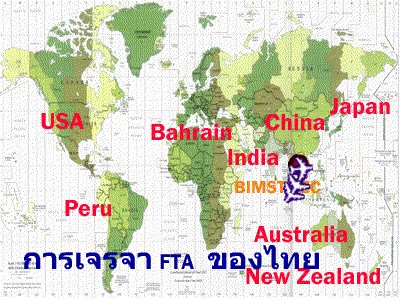
Bangko Post (1 Nov 2007)
The free trade agreement between Thailand
and Japan took effect at midnight on Wednesday as scheduled. The FTA eliminates tariffs on more than 90 per cent of goods in bilateral trade, many immediately and the rest over the next 10 years. Under the economic partnership agreement between Japan and Thailand, signed in April, Japan will abolish tariffs on imports of Thai mangoes and shrimps, among other products. It will also relax immigration controls for cooks from Thailand. Thailand will lower import tariffs on Japanese cars and other products in stages.
Japan hails free trade deal with Thailand
TOKYO (AFP) — Japan on Wednesday hailed a free trade deal with Bangkok, a day before the pact is due to go into effect despite protests in Thailand including a wildcat strike by train drivers. Thailand's Foreign Minister Nitya Pibulsonggram held talks in Tokyo with his Japanese counterpart Masahiko Komura to mark the start of a free-trade deal.
 "Starting tomorrow, the bilateral economic partnership agreement will take effect. I hope this agreement will further strengthen ties between Japan and Thailand," Komura told reporters. As well as the broad talks with Komura, the Thai minister will participate in a joint meeting Thursday on implementing the free-trade agreement between the two countries, a trade ministry official said. The controversial deal was inked in April after months of uncertainty due to Japan's unease over the military coup in Bangkok. Activists in Thailand have expressed fears that the deal will turn their country into a dumping ground for Japan's toxic waste. In Thailand, thousands of passengers were stranded on Wednesday as train drivers staged a rare wildcat strike. Drivers refused to work on express trains in the south of Thailand and in the northern city of Chiang Mai, while international services connecting Thailand with Butterworth in northern Malaysia were affected. Drivers were concerned that their jobs would be threatened by the free trade pact with Japan, which would allow private companies to operate on Thailand's state-owned railways, said Bancha Kongnakorn, acting governor of State Railway of Thailand. "We will clarify with the train drivers that their jobs will be secure -- private freight carriages still need locomotive drivers to pull them," he said. However, the State Railway Workers Union of Thailand issued a statement saying the train drivers were on strike to protest against incompetence by railway executives and the board. Under the free-trade agreement, about 97 percent of Japanese exports to Thailand and 92 percent of Thai exports to Japan will be tariff-free within 10 years. Japan will scrap tariffs on Thai shrimp and tropical fruit such as mangoes and durian, but will keep protecting its politically powerful rice farmers. Thailand will cut tariffs on automobiles with engines of 3,000cc or larger to 60 percent from 80 percent over four years and eventually scrap all tariffs on steel imports. Japan, the world's second-largest economy, has been seeking a growing number of bilateral free-trade deals amid the breakdown in global liberalisation talks.
"Starting tomorrow, the bilateral economic partnership agreement will take effect. I hope this agreement will further strengthen ties between Japan and Thailand," Komura told reporters. As well as the broad talks with Komura, the Thai minister will participate in a joint meeting Thursday on implementing the free-trade agreement between the two countries, a trade ministry official said. The controversial deal was inked in April after months of uncertainty due to Japan's unease over the military coup in Bangkok. Activists in Thailand have expressed fears that the deal will turn their country into a dumping ground for Japan's toxic waste. In Thailand, thousands of passengers were stranded on Wednesday as train drivers staged a rare wildcat strike. Drivers refused to work on express trains in the south of Thailand and in the northern city of Chiang Mai, while international services connecting Thailand with Butterworth in northern Malaysia were affected. Drivers were concerned that their jobs would be threatened by the free trade pact with Japan, which would allow private companies to operate on Thailand's state-owned railways, said Bancha Kongnakorn, acting governor of State Railway of Thailand. "We will clarify with the train drivers that their jobs will be secure -- private freight carriages still need locomotive drivers to pull them," he said. However, the State Railway Workers Union of Thailand issued a statement saying the train drivers were on strike to protest against incompetence by railway executives and the board. Under the free-trade agreement, about 97 percent of Japanese exports to Thailand and 92 percent of Thai exports to Japan will be tariff-free within 10 years. Japan will scrap tariffs on Thai shrimp and tropical fruit such as mangoes and durian, but will keep protecting its politically powerful rice farmers. Thailand will cut tariffs on automobiles with engines of 3,000cc or larger to 60 percent from 80 percent over four years and eventually scrap all tariffs on steel imports. Japan, the world's second-largest economy, has been seeking a growing number of bilateral free-trade deals amid the breakdown in global liberalisation talks.
No comments:
Post a Comment